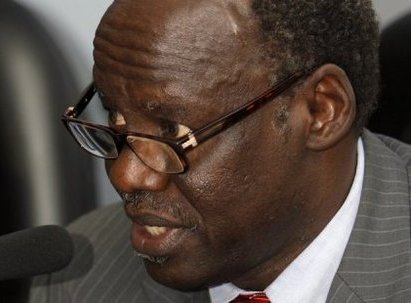S. Sudan opposition leader calls for subordination of individual interests
June 20, 2014 (JUBA) – The leader of the opposition Sudan People’s Liberation Movement for Democratic Change (SPLM-DC) has called on South Sudan’s warring factions and other stakeholders to rise above individual interests if they were to end the country’s raging conflict.

“We must all denounce war and work selflessly to attain peace”, he added.
Akol, in a statement delivered Friday, stressed that the talks mediated by the East African regional bloc (IGAD) provided the best opportunity for the two parties to end their political differences.
He further explained that war had already claimed thousands of lives in targeted ethnic killings, with more than a million displaced and several properties destroyed as a result of various clashes.
“Above all, our social fabric is now in tatters. All this is for nothing other than fighting over power. What is the use of that power if it is to be achieved over the skulls of the very people one would want to rule? Just over two years in our independence we have not only failed to meet the aspirations of our people, which are modest by all standards, but it seems we are hell bent to engage in self-destruction”, said Akol.
“This senseless war must stop and stop now. Nobody is a winner in this war as those who are killed on both sides are South Sudanese. The only loser is South Sudan”, added the opposition leader in a statement delivered as talks between the two parties resumed in Ethiopia.
SLOW PROGRESS
Meanwhile the leader of the government delegation, Nhial Deng Nhial expressed fears that the talks could move at slow pace, unless measures were put in place to control fighting between both warring parties as required by the cessation hostilities agreement agreed upon.
“We wish to assure everyone sitting here in this round table that we are committed to restoring peace to our country and will negotiate in good faith to achieve that goal. We hope that the other party shares the same commitment. However, we still believe that the most important thing to achieve, first and foremost, is a complete cessation of hostilities, to create a conducive atmosphere for the talks”. Nhial said Friday.
“Unless this happens, it may be difficult to reach agreement on the transitional arrangements”, he added.
The government chief negotiator also poured out his frustration on what he said was the failure to promptly and fully operationalise the much-needed Monitoring and Verification Mechanism (MVM).
“The Cessation of Hostilities Agreement (COH) was signed on 23rd January 2014 and to date the monitors are not in all the places agreed for them to be stationed. Had this happened as we suggested to Special Envoys that the MVM be put in place before the Agreement came to force, a lot of lives might have been saved. IGAD must bear some of the responsibility for this failure”, Nhial said in a statement at the opening session of the talks.
“Secondly, we must express our disappointment at the fact that IGAD blames both the government and the opposition in equal measure, whenever the SPLM/A (in opposition) violate the COH Agreement, even when they have known very well that the government forces have not been involved in any breaches”, he added
Talks between the two parties got off to a slow start after South Sudan government petitioned IGAD over an “inappropriate” comment allegedly uttered by a member of the negotiating team.
IGAD’s executive secretary, Mahboub Maalim allegedly described president Salva Kiir and rebel leader Riek Machar as “stupid” for pursuing military means instead of peace talks to end the crisis.
(ST).
